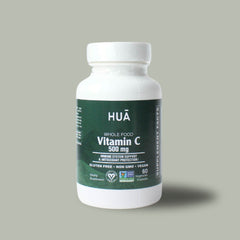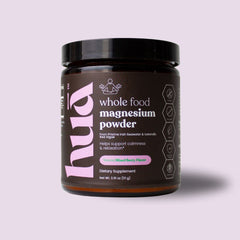Magnesium: Benefits of this Popular Supplement
Table of Contents
- What is Magnesium?
- Benefits of taking magnesium at night
- Magnesium for Migraines
- Understanding the Link Between Magnesium and Migraines
- Research on Magnesium and Migraine Prevention
- Magnesium and Muscle Recovery
- Magnesium and Bone Health
- Magnesium and Heart Health
- Choosing the Magnesium Supplement for You
In the realm of wellness and supplements, few minerals hold as much popularity as magnesium in recent time. As the fourth most abundant mineral in the human body, magnesium is involved in hundreds of enzymatic reactions in the body. It is in every cell type in every organism. Despite its crucial role, many people fail to obtain an adequate amount of magnesium through diet alone. Factors such as soil depletion, modern agricultural practices, dietary restrictions, health conditions and lifestyle contribute to this deficiency, making magnesium supplementation an increasingly popular choice for people.
What is Magnesium?
Magnesium is an essential mineral that the body cannot produce on its own, necessitating a consistent intake from dietary sources plus the option to supplement. It is macronutrient - meaning we need lots of it. It is found in various foods, including leafy greens, nuts, seeds, whole grains, and certain types of fish. However, due to factors such as soil depletion and food processing, the magnesium content in many foods may not be as nutrient dense as they used to be over time. Additionally, certain lifestyle factors, dietary restrictions and health conditions can lead people to be deficient in magnesium.
Foods High in Magnesium
Incorporating magnesium-rich foods into your diet is an excellent way to ensure adequate intake of this essential mineral. Magnesium is found in various foods, including:
- Leafy greens such as spinach, kale, and Swiss chard
- Nuts and seeds like almonds, cashews, and pumpkin seeds
- Legumes such as black beans, chickpeas, and lentils
- Whole grains like brown rice, quinoa, and oats
- Fatty fish like salmon, mackerel, and halibut
- Avocados
If you have dietary restrictions or simply want extra insurance, you can also add a magnesium supplement to your routine.
Magnesium Deficiency Symptoms
- Muscle cramps and spasms, due to magnesium's role in muscle contraction and relaxation.
- Chronic fatigue and muscle weakness, as magnesium is essential for many processes within the body, including energy production
- Irregular heartbeat, which can occur when magnesium levels are insufficient to support normal cardiac function.
- Nausea, vomiting, and loss of appetite
- Increased susceptibility to conditions such as osteoporosis, high blood pressure, and migraines with chronic magnesium deficiency.
If experiencing any of these symptoms, it's important to consult with a healthcare professional for proper evaluation and guidance on supplementation or dietary changes.
Benefits of taking magnesium at night
To fall asleep, it helps if your body and mind are relaxed. Magnesium can promote this relaxation by influencing neurotransmitters and hormones that are involved in sleep. For example, magnesium binds with gamma-aminobutyric acid (GABA), an inhibitory neurotransmitter that reduces nerve activity and thus, quiets your mind. Magnesium also helps regulate melatonin, a hormone that controls the sleep-wake cycle. Melatonin levels rise at night in response to darkness, signaling to the body that it is time to wind down and prepare for sleep. Adequate magnesium levels support the production and release of melatonin, ensuring a smooth transition into the sleep phase.

Research on Magnesium and Sleep Quality
Numerous studies have investigated the relationship between magnesium intake and sleep quality, consistently finding magnesium that improves various aspects of sleep. A 2012 study found that elderly adults, which is a group that commonly suffers with insomnia, who took magnesium supplements before bed had significantly longer sleep time and better sleep efficiency compared to those who took a placebo. More research is needed to understand how magnesium supplements impact sleep for younger age groups but many people anecdotally report that they experience improved sleep after supplementing magnesium.
How to Incorporate Magnesium for Better Sleep
Incorporating magnesium into your bedtime routine is simple and convenient. The magnesium from HUA Wellness is a powder form that can easily be mixed with water or in a more indulgent mocktail to drink before bedtime, which has the added benefit of getting some hydration in too. It is also a great choice for those who have trouble swallowing large capsules. While magnesium tablets or capsules are also a popular choice, the powdered form can have a faster absorption so you can feel the effects more quickly. Magnesium needs to be ionized to be in its active form - this happens as soon as you mix the powder with the water so you would already be consuming the ionized form – the most bioavailable form – when you drink it. A capsule or tablet would have to wait for your stomach acid to ionize it, leading to a potentially delayed effect and reduced absorption.
However, if magnesium improves your sleep quality, it’s largely up to your individual preference on which form suits you best that you can consistently utilize.
Magnesium for Migraines
Migraines are debilitating headaches characterized by intense throbbing pain, often accompanied by nausea, sensitivity to light and sound, and other neurological symptoms. These episodes can significantly disrupt daily life. While the exact cause of migraines is not fully understood, research suggests that magnesium deficiency may play a role in migraine pathophysiology.

Understanding the Link Between Magnesium and Migraines
Research has indicated that people with migraines are more likely to have a magnesium deficiency. It is believed that magnesium can block certain signals in the brain that lead to migraines with an aura, and that magnesium can block chemicals that cause the pain in migraines. Additionally, people with low magnesium have been associated with tightening of blood vessels in the brain, or vasoconstriction, that is also part of migraine attacks.
Research on Magnesium and Migraine Prevention
Several clinical studies have investigated the effects of magnesium supplementation on migraine prevention, with promising results. A 2016 meta-analysis published in the Pain Physician Journal found that magnesium supplementation was associated with a significant reduction in migraine frequency and severity compared to placebo. Another study showed that administering magnesium to migraine patients in the ER helped provide relief faster and more efficiently than when given a common medication.
Ultimately, there needs to be more research on understanding the exact mechanism that magnesium supplements can alleviate migraines. However, as it is a safe and widely available tool, it is encouraged that anyone suffering with migraines give magnesium supplements a try – as well as consuming more magnesium from their diets. Talk to a doctor first for personalized advice.
Magnesium and Muscle Recovery
Healthy muscle function is essential for maintaining an active lifestyle. Magnesium plays a crucial role in supporting muscle function and recovery during exercise.
Magnesium helps muscles take in glucose for energy and dispose of lactate, which builds up during exercise and causes fatigue. It is also a calcium blocker. Calcium binds with proteins in your muscles to cause contractions. Magnesium acts as a blocker by competing with the same binding sites as calcium. When you don’t have enough magnesium, your muscles may contract too much, leading to spasms and cramps.
A study on college athletes supplementing with magnesium versus placebo reported that athletes on magnesium experienced less muscle soreness and improved performance. Another study demonstrated magnesium supplementation resulted in exercise improvements for elderly people and people deficient in the nutrient.
Magnesium and Bone Health
Maintaining strong and healthy bones is essential for overall mobility and longevity. Magnesium contributes to bone health by being involved in bone mineralization, density, and strength.
The Role of Magnesium in Bone Mineralization
Magnesium is a key component of the bone matrix, accounting for approximately 60% of total body magnesium content. It acts as a cofactor for enzymes involved in the synthesis of bone matrix proteins, including collagen, which provides the structural framework for bones. Additionally, magnesium helps regulate calcium homeostasis, facilitating the deposition of calcium onto the collagen matrix to form new bone tissue.
Research on Magnesium and Bone Density
Several studies have investigated the relationship between magnesium intake and bone health, with compelling evidence supporting the beneficial effects of magnesium supplementation on bone density and strength. Research has found that those with a magnesium deficiency are at a higher risk for fractures and osteoporosis. Another study that explored daily magnesium supplementation in young adult men found that supplementing with magnesium resulted in less bone turnover. Bone turnover is the process of replacing old bone with new bone. However, high bone turnover is typically associated with bone diseases such as osteoporosis since high turnover indicates bone loss. This study raised the possibility of utilizing magnesium as a way to reduce the bone loss caused by high bone turnover.
Magnesium and Heart Health
Magnesium is involved in numerous physiological processes that are vital for maintaining cardiovascular function. One of its key roles is in regulating cardiac muscle contraction and relaxation, which is essential for maintaining a steady heartbeat and proper circulation. Magnesium also helps regulate blood pressure by influencing the tone of blood vessels and supporting the relaxation of smooth muscle cells in the arterial walls.
What the research says
Several studies have investigated the relationship between magnesium intake and cardiovascular health. A 2017 meta-analysis found that magnesium supplementation could decrease the risk of cardiac disease in type 2 diabetics. They found that magnesium improved the outcomes of several cardiac disease risk factors, such as fasting glucose, low-density lipoprotein (LDL), high-density lipoprotein (HDL), triglycerides, and systolic blood pressure.
Magnesium deficiency has also been linked to an increased risk of arrhythmias, or irregular heartbeats. Magnesium plays a crucial role in regulating the electrical activity of the heart, influencing the conduction of electrical impulses and the rhythm of heartbeats. A meta-analysis examined if supplementing magnesium post-cardiac surgery reduced the incidence of cardiac arrhythmia. Cardiac arrhythmia is a common complication of cardiac surgery that can lead to death. Their analysis showed that the total rate of cardiac arrhythmia was significantly lower in the group receiving magnesium supplementation than placebo. The study concluded that magnesium supplementation post-cardiac surgery is a safe, effective and cost-effective way to prevent cardiac arrhythmias.
Choosing the Magnesium Supplement for You
Types of Magnesium Supplements
Magnesium supplements come in various forms, with some more bioavailable than others. Choosing the right form of magnesium is essential for ensuring optimal absorption and effectiveness. Some of the most common forms of magnesium found in supplements include:
- Magnesium Citrate: This form of magnesium is highly bioavailable and easily absorbed by the body. It also has benefits for digestion by having a mild laxative effect. Our Whole Food Magnesium Powder is in the form of magnesium citrate.
- Magnesium Glycinate: Magnesium glycinate is a chelated form of magnesium, meaning it is bound to glycine, an amino acid. This form of magnesium is also well-absorbed.
- Magnesium Oxide: While magnesium oxide has a higher magnesium content by weight, it is less bioavailable than other forms of magnesium.
- Magnesium Chloride: Magnesium chloride is absorbed well by the body and can be found in topical magnesium products, such as magnesium oil or lotion, though it is unclear how well magnesium can be absorbed through the skin. It can also be an oral supplement.
- Magnesium Sulfate: Commonly known as Epsom salt, magnesium sulfate is often used in baths for its relaxing and muscle-soothing properties. It can also be taken orally but is known to have an unpleasant taste.
Choosing a Quality Magnesium Supplement
In addition to considering the form of magnesium, it is important that you consider several factors to ensure you select a high-quality supplement:
- Purity: Choose supplements with minimal to no additives, fillers, or artificial ingredients.
- Bioavailability: Opt for forms of magnesium that are easily absorbed by the body, as mentioned before, such as magnesium citrate or magnesium glycinate.
- Third-Party Testing: Select supplements that undergo third-party testing for purity, and safety. Look for evidence on a brand’s website that they do third-party testing. If a supplement is not third-party tested, then it is not guaranteed that the supplement contains what the label claims. All HUA Wellness supplements are third-party tested - in an industry that most are not.
- Ingredient Quality: Consider supplements sourced from natural, reputable sources. Look for products derived from high-quality ingredients with minimal processing. Our Whole Food Magnesium is a pure natural magnesium sourced from the Arctic Ocean.
- Diet Friendly: Check that the magnesium supplement works for your diet, whether they are due to dietary restrictions or by choice. Our Whole Food Magnesium Powder is Gluten Free, Non-GMO, and Certified Vegan.
We hope you find the right magnesium supplement for you, whatever your health goals may be. Here at HUA Wellness, we prioritize ingredient sourcing from real foods and natural ingredients. Our Whole Food Magnesium is pure natural magnesium sourced from seawater and red algae in the Arctic Ocean. Our formula offers magnesium in its most natural form to optimize bioavailability, amplifying the many benefits of this important mineral.


